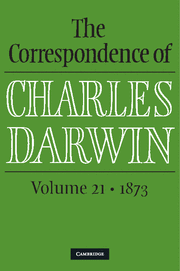 Having laboured for nearly five years on human evolution, sexual selection, and the expression of emotions, Darwin was able to devote 1873 almost exclusively to his beloved plants. He resumed work on the digestive powers of sundews and Venus fly traps, and the comparative fertility and vigour of self- and cross-pollinated species, work that would culminate in two books, Insectivorous plants(1875) and Cross and self fertilisation(1876). Darwin’s son Francis became increasingly involved in this botanical research, eventually renouncing plans for a medical career to become his father’s scientific secretary. Darwin had always relied on assistance from within the family, and he was clearly delighted by Francis’s decision. A large portion of the letters Darwin received in 1873 were in response to The expression of the emotions in man and animals, published the previous year. As was typical, readers wrote to Darwin personally to offer suggestions, observations, and occasional criticisms, some of which were incorporated in a later edition. Darwin also contributed to discussions in the scientific weekly Nature on the role of inherited and acquired characteristics in animals. The subject was brought closer to home by Francis Galton’s work on inherited talent, which prompted Darwin to reflect on the traits and conditions that had led to his achievement in science. The importance Darwin attached to friendship and patronage in science were manifest in his leading roles in creating a private memorial fund for Thomas Henry Huxley, and in efforts to alleviate the financial troubles of Anton Dohrn’s Zoological Station at Naples.
Having laboured for nearly five years on human evolution, sexual selection, and the expression of emotions, Darwin was able to devote 1873 almost exclusively to his beloved plants. He resumed work on the digestive powers of sundews and Venus fly traps, and the comparative fertility and vigour of self- and cross-pollinated species, work that would culminate in two books, Insectivorous plants(1875) and Cross and self fertilisation(1876). Darwin’s son Francis became increasingly involved in this botanical research, eventually renouncing plans for a medical career to become his father’s scientific secretary. Darwin had always relied on assistance from within the family, and he was clearly delighted by Francis’s decision. A large portion of the letters Darwin received in 1873 were in response to The expression of the emotions in man and animals, published the previous year. As was typical, readers wrote to Darwin personally to offer suggestions, observations, and occasional criticisms, some of which were incorporated in a later edition. Darwin also contributed to discussions in the scientific weekly Nature on the role of inherited and acquired characteristics in animals. The subject was brought closer to home by Francis Galton’s work on inherited talent, which prompted Darwin to reflect on the traits and conditions that had led to his achievement in science. The importance Darwin attached to friendship and patronage in science were manifest in his leading roles in creating a private memorial fund for Thomas Henry Huxley, and in efforts to alleviate the financial troubles of Anton Dohrn’s Zoological Station at Naples.
Darwin had resumed experiments on the common sundew. Taking up his research again in January, he wrote to Joseph Dalton Hooker, “It is wonderful how many points I omitted to observe, which I ought to have observed” (letter to J. D. Hooker, 12 January [1873]). Drosera was the main focus of Darwin’s study of insectivorous plants, a group that also included the Venus fly trap (Dionaea muscipula). The experiments involved not only feeding meat, egg, and gelatine to the plants, but also applying various acids and alkaloids, and even electrical stimulation. On sending Darwin a specimen of the carnivorous Drosophyllum lusitanicum, Hooker wrote: “Pray work your wicked will on it—root leaf & branch!” (letter from J. D. Hooker, 12 January 1873). Darwin found that the glandular hairs on the leaves of Drosera were sensitive to slight pressure and minute quantities of fluid. Material applied to the centre caused the outermost tentacles to bend inward, so that the plant closed like a fist. Darwin was fascinated by this transmission of “motor impulse”, which seemed analogous to muscular contraction in animals: “a nerve is touched … a sensation is felt” (Insectivorous plants, p. 63). The plants secreted a viscid fluid, which Darwin suspected attracted insects by its odour, like “a baited trap” (ibid., p. 17). Through a series of painstaking experiments, Darwin determined that the secretions increased and became more acidic after inflection, like the gastric juices in the stomach, so that the plant could be said “to feed like an animal” (ibid., p.18).








